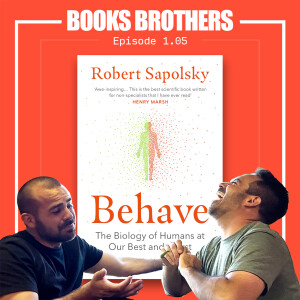Episodes

Monday Jun 16, 2025
Monday Jun 16, 2025
The Molecule of More - Books Brothers Podcast
Join JD and Andrew as they dive deep into "The Molecule of More" by Daniel Lieberman and Michael Long - exploring how dopamine drives human behavior, relationships, creativity, and our never-ending pursuit of "more."
🧠 What You'll Learn:
The difference between "wanting" and "liking" - and why dopamine controls wanting, not pleasure
How dopamine creates two distinct brain circuits: desire vs. control
Why the honeymoon phase in relationships only lasts about a year
The surprising connection between dopamine and political ideology
How immigrants and entrepreneurs share similar dopaminergic traits
Why creative people are 25x more likely to have bipolar disorder
The neuroscience behind addiction, love, and achievement
🎯 Key Takeaways:
Dopamine is the "molecule of more" - it never says "enough"
There are two types: desire dopamine (limbic) and control dopamine (prefrontal cortex)
Balancing future-focused dopamine with "here and now" chemicals leads to greater happiness
Mastery combines both systems for optimal satisfaction
📚 About Books Brothers:
We read the big ideas books so you don't have to! Subscribe for summaries of books like Sapiens, Righteous Mind, Behave, and more.
🔔 Subscribe for more book breakdowns and hit the bell for notifications!
💭 What's your dopamine weakness? Let us know in the comments!
Chapter Markers
0:00 - Introduction & Book Overview
1:30 - What is Dopamine? The Molecule of More
2:45 - Here and Now vs. Future Molecules
8:15 - Chapter 1: Love - Dopamine in Relationships
16:00 - From Passionate to Companionate Love
19:30 - Sex and the Dopamine Switch
23:00 - Chapter 2: Drugs - Desire vs. Control Circuits
28:45 - Why Adderall Helps ADHD vs. Cocaine Addiction
35:00 - Chapter 3: Domination - Control Dopamine in Action
42:00 - The Buzz Aldrin Effect: Achievement Addiction
45:30 - Willpower as a Limited Resource
48:00 - Chapter 4: Creativity and Madness
52:15 - Why Artists Are 25x More Likely to Have Bipolar
55:45 - John Nash and the Beautiful Mind Connection
58:30 - Isaac Newton: Genius and Virgin
60:00 - Chapter 5: Politics - Liberal vs. Conservative Brains
65:30 - Dopamine and Political Ideology
68:45 - Charitable Giving: Here and Now vs. Abstract Policy
72:00 - Chapter 6: Progress - How Dopamine Got Us Out of Africa
75:30 - The DRD4 Gene and Human Migration
78:15 - Polynesians and Extreme Exploration
80:45 - America as the "Dopamine Nation"
83:30 - Immigration and Entrepreneurship Statistics
86:00 - De Tocqueville's Observations on Restless Americans
88:30 - The Fertility Crisis and Safety Nets
90:45 - Final Thoughts: Balancing Dopamine and Here-and-Now
93:00 - The Avatar Metaphor for Perfect Balance
95:30 - Mastery: When Dopamine and Present Merge
98:15 - Construction Workers and Optimal Happiness
60:00 - Conclusion: A More Balanced Way of Being Human

Monday Jun 02, 2025
I Came to Cast Fire - Episode 9
Monday Jun 02, 2025
Monday Jun 02, 2025
In this episode, the hosts explore René Girard's mimetic theory through Friar Elias Carr's 2024 book "I Came to Cast Fire: An Introduction to René Girard." The conversation examines how human desires aren't entirely our own but are shaped by imitating others, creating cycles of rivalry and conflict that have defined human societies throughout history.
The hosts discuss Girard's insight that humans are the "culture-making animal" whose social structures evolved from the "scapegoat mechanism" - a process where communities channel violence toward a single victim to restore peace. They look at how this pattern created religious rituals, myths, and prohibitions that formed the foundation of ancient civilizations.
The discussion moves from ancient ancestor worship to biblical interpretations, examining how Jesus's crucifixion and resurrection uniquely exposed this scapegoat mechanism from the victim's perspective, offering humanity a path beyond mimetic violence. The hosts work through these dense philosophical concepts while questioning evidence for some of Girard's more controversial claims.
Connecting cultural evolution, religious worship, and human conflict, this episode presents the hidden mimetic patterns Girard identified in human societies. The conversation covers anthropology, religious studies, and theories about how imitation shapes both our individual desires and our collective institutions.

Thursday May 01, 2025
Wanting - The Hidden Forces Behind Your Desires - Episode 8
Thursday May 01, 2025
Thursday May 01, 2025
In this mind-bending episode, Andrew and JD explore René Girard's revolutionary mimetic theory through Luke Burgis's accessible book "Wanting." Discover why your deepest desires might not actually be your own!
We dive into:
- Why we mimic the desires of our "models" (from celebrities to rivals)
- How mimetic rivalries escalate into violence and conflict
- The surprising connection between scapegoating and civilization
- Why René Girard became Christian after developing his theory
- Practical ways to escape mimetic desire and find authentic purpose
From Peter Thiel's investment philosophy to why hipsters all look alike while no one identifies as one, this episode will transform how you understand human motivation, marketing, social media, and even ancient religious practices.
NEW: We're releasing TWO episodes monthly in April and May!
Watch on YouTube! Our amazing video editor and graphics team illustrates all the key ideas and quotes throughout the episode, creating a visually stunning experience that brings these concepts to life. Trust us - this one is worth watching!
#MimeticDesire #BooksBrothers #PersonalDevelopment

Tuesday Apr 15, 2025
1.07 The 7 Habits of Highly Effective People - Stephen Covey
Tuesday Apr 15, 2025
Tuesday Apr 15, 2025
In this episode of Books Brothers, JD and Andrew break down Stephen Covey's seminal work "The 7 Habits of Highly Effective People." Published in over 50 languages and named the most influential business book of the 20th century, Covey's framework distills centuries of self-improvement literature into actionable habits for personal growth. The brothers discuss how Covey spent years studying success literature since 1776 to create principles for living your best life aligned with timeless values. From taking control of your life to building meaningful relationships, this episode unpacks how to move from dependence to independence to interdependence through Covey's transformative seven habits.
Chapter Markers
00:00:00 - Introduction to the book's influence and reach
00:02:00 - Covey's research process and the book's core message
00:04:20 - The Character Ethic vs. Personality Ethic
00:08:10 - Principle-Centered Paradigm and taking responsibility
00:10:57 - Habit 1: Be Proactive
00:13:25 - Viktor Frankl and choosing your response
00:17:15 - The mindset of reactive vs. proactive people
00:19:13 - Habit 2: Begin With the End in Mind
00:21:08 - Leadership vs. Management
00:22:00 - Creating a personal mission statement
00:24:03 - Center of your life: principles vs. other centers
00:26:56 - Habit 3: Put First Things First
00:28:34 - The Four Quadrants of Time Management
00:31:00 - Stewardship vs. Go-for Delegation
00:33:54 - Trust Banks and relationship building
00:36:10 - Habit 4: Think Win-Win
00:38:25 - Problems with competition in society
00:41:51 - Habit 5: Seek First to Understand, Then to Be Understood
00:43:35 - Empathic listening and its power
00:45:44 - Ethos, Pathos, Logos and communication
00:46:13 - Habit 6: Synergize
00:47:52 - Habit 7: Sharpen the Saw
00:49:02 - The Eighth Habit and final thoughts
00:52:09 - Summary of all seven habits
References
Books:
"The 7 Habits of Highly Effective People" by Stephen Covey (00:01:06)
"The 8th Habit" by Stephen Covey (00:49:06)
"The Speed of Trust" by Stephen M.R. Covey (00:50:18)
"Man's Search for Meaning" by Viktor Frankl (00:13:44)
"How to Win Friends and Influence People" by Dale Carnegie (mentioned at 00:06:38)
People:
Viktor Frankl (00:13:44, "friend of the show")
Benjamin Franklin (00:02:30)
Dale Carnegie (00:02:30)
Tony Robbins (00:02:30)
Johann Wolfgang von Goethe (00:18:32)
Warren Buffett (00:50:18)
Peter Thiel (00:38:56, reference to "Zero to One")
Jocko Willink (implied at 00:28:23 as "our guy Jocko, a friend of the program")
Jonathan Haidt (00:42:50, reference to elephant and rider metaphor)
Concepts:
Character Ethic vs. Personality Ethic (00:04:48)
Principle-centered paradigm (00:08:11)
Production vs. Production Capability (P/PC Balance) (00:10:25)
Stimulus and Response model (00:14:29)
Trust Banks (00:33:55)
Four Quadrants of Time Management (00:28:34)
Scarcity vs. Abundance Mentality (00:41:06)
Ethos, Pathos, Logos (00:45:07)
Other Podcast References:
"Righteous Mind" (00:51:40, reference to another Books Brothers episode)
"General Theory of Love" (00:44:26, reference to another Books Brothers episode)

Thursday Apr 03, 2025
1.06 A General Theory of Love
Thursday Apr 03, 2025
Thursday Apr 03, 2025
Join the Dennison Brothers as they dive into "A General Theory of Love," a fascinating scientific exploration of what makes us connect on a deeper level. What exactly is love from a neurological perspective? Three psychiatrists from UCSF propose that it's "limbic resonance" - the way our emotional brains synchronize with others.
In this episode, we break down how the limbic system (the emotional part of our brain) creates connections that literally help regulate our emotions and physical well-being. From how mothers shape their children's emotional patterns to why isolation is so damaging to humans, this book offers a scientific framework for understanding our deepest relationships.
Discover why humans are "open loops" that require others to function properly, how childhood experiences encode our emotional responses, and the scientific evidence showing that connection isn't just nice - it's necessary for survival. Whether you're building personal relationships or professional networks, understanding the biology behind human connection gives you powerful insights into yourself and others.
Shownotes:
Book Information
Title: A General Theory of Love
Authors: Thomas Lewis, Fari Amini, and Richard Lannon (all professors of psychiatry from UCSF School of Medicine) [00:03:13]
Studies & Researchers Mentioned
- Conrad Lorenz: Study on imprinting in ducklings [00:24:31]
- Frederick the Second: 13th century experiment on language development [00:25:47]
- Rene Spitz: Studies on orphaned children in the 1940s [00:26:04]
- Mary Ainsworth: Research on mother-baby attachments and parenting styles [00:26:45]
- Paul Ekman and Carol Izzard: Research confirming universal facial expressions [00:17:36]
- Paul Broca: Identified the "great limbic lobe" [00:11:23]
- Charles Darwin: "The Expression of the Emotions in Man and Animals" [00:16:36]
Other Books & Authors Referenced
- Robert Sapolsky's "Behave": Referenced when discussing the triune brain [00:09:37]
- Jonathan Haidt's "The Righteous Mind": Referenced for the elephant and rider metaphor [00:10:01]
- Judith Rich Harris's "The Nurture Assumption": Referenced in discussing genetic vs. environmental factors [00:28:27]
- Yuval Noah Harari's "Sapiens": Referenced multiple times [00:14:07, 00:29:18]
- Sam Harris: Mentioned regarding free will and parenting [00:27:59]
- Ralph Waldo Emerson: Quote about temperament [00:19:46]
- Blaise Pascal: Quote at the end [00:44:32]
Media & Pop Culture References
- Joe Rogan & Elon Musk podcast: Where the hosts first heard about "limbic resonance" [00:24:04]
- Into the Wild (Alexander Supertramp): "Happiness is only real when shared" [00:31:00]
- Haddaway's "What is Love": Referenced as the episode's theme song [00:01:48]
Notable Quotes
- "The mammalian nervous system cannot self-assemble" [00:33:40]
- "For a mute mammal, play is physical poetry" [00:13:36]
- "Freud's logic was a veritable Mobius strip of circularity and belongs to a priest. Scientific era" [00:05:09]
#BrainScience #EmotionalIntelligence #RelationshipScience #PsychologyBooks #PersonalDevelopment #BookReview #LimbicResonance #NeuroscienceOfLove #MensHealth #SelfImprovement #BookSummary #MindsetMastery #MentalModels #ProfessionalGrowth #BrotherBooks

Thursday Mar 06, 2025
1.05 Behave: the Biology of Humans at Our Best and Worst - Robert Sapolsky
Thursday Mar 06, 2025
Thursday Mar 06, 2025
In this epic deep-dive episode, brothers JD and Andrew Dennison tackle Robert Sapolsky's masterwork "Behave: The Biology of Humans at Our Best and Worst." We explore how our brains, hormones, genes, and environment shape human behavior from seconds to millions of years before an action occurs. From the neuroscience of decision-making to the evolutionary roots of tribalism, they break down Sapolsky's fascinating insights into why we do what we do.
Key topics include:
How different brain regions like the amygdala, prefrontal cortex, and dopamine systems influence our choices
Why testosterone isn't just about aggression
The surprising truth about oxytocin (it's not all free love!)
What adolescent brain development reveals about human nature
How cultural evolution and biology intertwine to shape societies
00:07:42 Chapter 2: 1 second before: Neuroscience
00:44:46 Chapter 4 Hours to Days Before: Hormones
1:04:51 Chapter 5: Days to Months Before: Neuroplasticity
01:09:59 Chapter 6 Adolescence or Dude Where’s my Cortex
1:20:21 Chapter 7 Years Before Back to the Crib Back to the Womb
1:29:28 Chapter 8 Fertilized egg or how our genetic affect our behavior
1:38:21 Chapter 9 Centuries to Millennia : cultures
1:47:13 Chapter 11 Us Vs. Them
2:03:06 Chapter 12 Hierarchy, obedience and resistance
2:17:16 Chapter 13 Morality doing the right thing
2:17:22 Chapter 14: feeling someone’s pain as your own
2:23:57 Chapter 15: Metaphors we kill by
2:33:02 Chapter 16: Biology The criminal justice system and oh why not free will
2:45:17 Chapter 17: war and Peace
The brothers share their enthusiasm for Sapolsky's brilliant writing style and humor while navigating complex topics like free will, human nature, and the biology behind both our best and worst behaviors. This comprehensive look at "Behave" showcases why it's a defining book in understanding human behavior through multiple scientific lenses.
Note: This is episode 5 of the "Human Evolution” season, where JD and Andrew explore groundbreaking books about what makes us human, from evolutionary biology to neuroscience and beyond.

Sunday Apr 05, 2020
1.04 Superintelligence: Paths, Dangers Strategies - Nick Bostrom
Sunday Apr 05, 2020
Sunday Apr 05, 2020
Many smart people out there say AI is an existential risk. AI Armageddon is certainly is a top-5 concern of enough people that we feel it warrants a deeper understanding. And in Superintelligence, Bostrom is the perfect robot-impersonating-author to teach us AI 101 while simultaneously capturing AI’s full scale and magnitude. He talked to everybody and covers the biggest questions: what are all the potential outcomes? How likely is AI? When might it happen? What’s the history of AI technology and are we excited about nothing? If an artificial intelligence does take over what would it do? High-probability take-over-the-world is on the early menu.
Plus, what’s the world’s current #robotpopulation? Could #serversruntheworld?
This book will make you think differently about the way your BRAIN and your SOCIETY operate. This Books Brothers summary will do ALL that and make you laugh.

Sunday Apr 05, 2020
1.03 The Selfish Gene - Richard Dawkins
Sunday Apr 05, 2020
Sunday Apr 05, 2020
Selfish Gene answers a deep and fundamental question: How does evolution work? We start our story in the Primordial Soup served hot at the Big Bang’s favorite diner, the single-cell-stew that brewed in Earth’s original oceans (after millions of years cooled the atmosphere obviously). The effect those little replicating cells, containing the world’s first DNA structures, have on our behavior today is 😳🤯🤔.
Plus, Dawkins colorfully illustrates why #NatureIsMetal and what really goes on #WhenaManLovesaWoman
This book will make you think differently about the way your BRAIN and your SOCIETY operate. This Books Brothers summary will do ALL that and make you laugh.
With Books Brothers podcasts, we do our best to share the author’s perspective. If you’ve read it before, you’ll know the book better. If you haven’t read it yet, you’ll learn what it contains and we hope you read it soon.
Andrew and JD

Sunday Apr 05, 2020
1.02 The Righteous Mind - Jonathan Haidt
Sunday Apr 05, 2020
Sunday Apr 05, 2020
The Righteous Mind answers a deep and fundamental question: why can’t we all just get along? Why can’t Democrats and Republicans understand each other better? Haidt answers these better than anyone (ever) by breaking down the social psychology and brain science of why our species is so apt to join groups, take sides and fight. The Righteous Mind covers 17 years of Haidt’s research into moral psychology and human behavior, and he uses it to explain our divided world today.
Plus, Hadit drops some bombs on our next book, Selfish Gene. #EmotionsFirstReasoningSecond #10%bee #BelongingNotBelieving
This book will make you think differently about the way your BRAIN and your SOCIETY operate. This Books Brothers summary will do ALL that and make you laugh.
With Book Brothers we do our best to share the author’s perspective. If you’ve read it before, you’ll know the book better. If you haven’t read it yet, you'll love it so much you'll go out an buy it
Enjoy!
-Andrew and JD

Sunday Apr 05, 2020
1.01 Sapiens - Yuval Noah Harari
Sunday Apr 05, 2020
Sunday Apr 05, 2020
Sapiens is a 416-page story of humankind from 6M years ago to today. Harari wraps it all up: our psychology, technology, religion, economy, politics… Nobody puts things quite the way Yuval does - he’s got some weird/deep thoughts and spits some fire trash talk at basically everything. We guarantee this book will make you stop and think about who we are and where we come from.
Plus it’s got plenty of #CavemanTalk and #YuvalSlamPoetry
This book will make you think differently about the way your BRAIN and your SOCIETY operate. This Books Brothers summary will do ALL that and make you laugh.
We do our best to share the author’s perspective. If you’ve read it before, you’ll know the book better. If you haven’t read it yet, you’ll love it so much you'll buy the book
Enjoy!
-Andrew and JD

